Are you seeking the Islamic Calendar 2025 (Hijri 1446-47)? With Ramadan fast approaching, Muslims must have a reliable source of information about the upcoming religious events to follow their spiritual calendar. For this reason, we have created this comprehensive blog post to answer all your queries regarding the Islamic Calendar 2025.
Here, we will discuss everything from how to read and use the calendar to critical holidays throughout the year. We will also provide the significant dates commemorating essential moments in Islamic history. Whether you are an experienced user or new to checking out these Hijri Calendar 2025 for guidance and reflection, join us as we explore Hijri 1446-47 together!
Overview of the Islamic Calendar and How It is Used
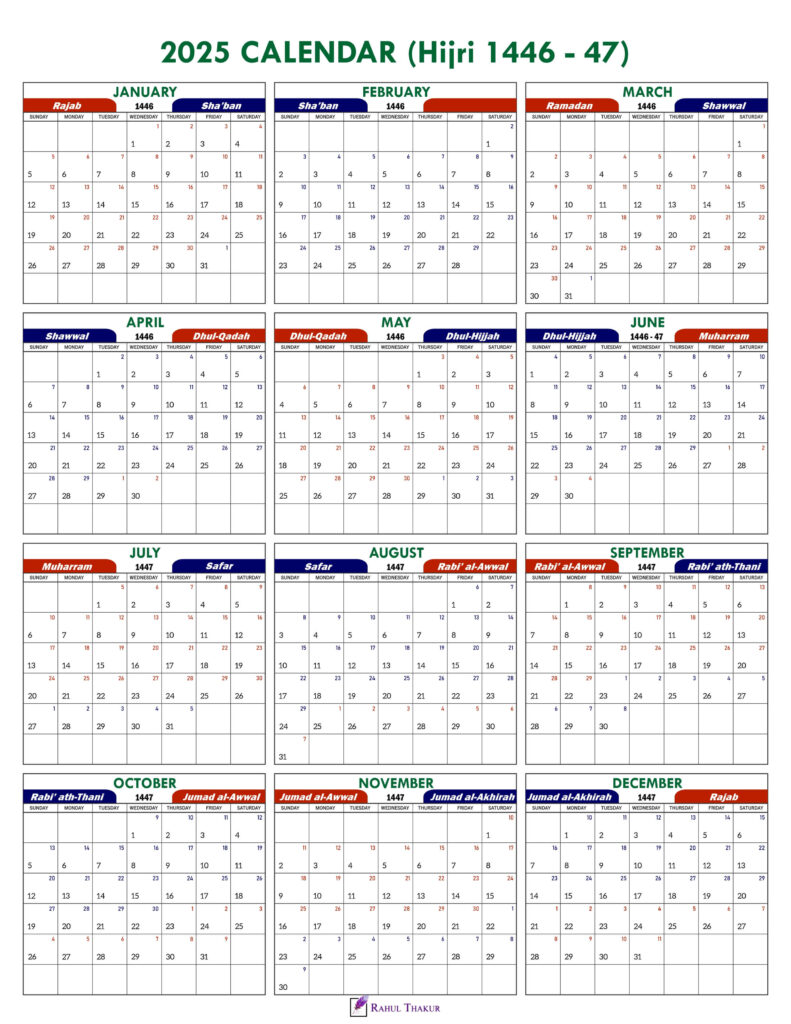
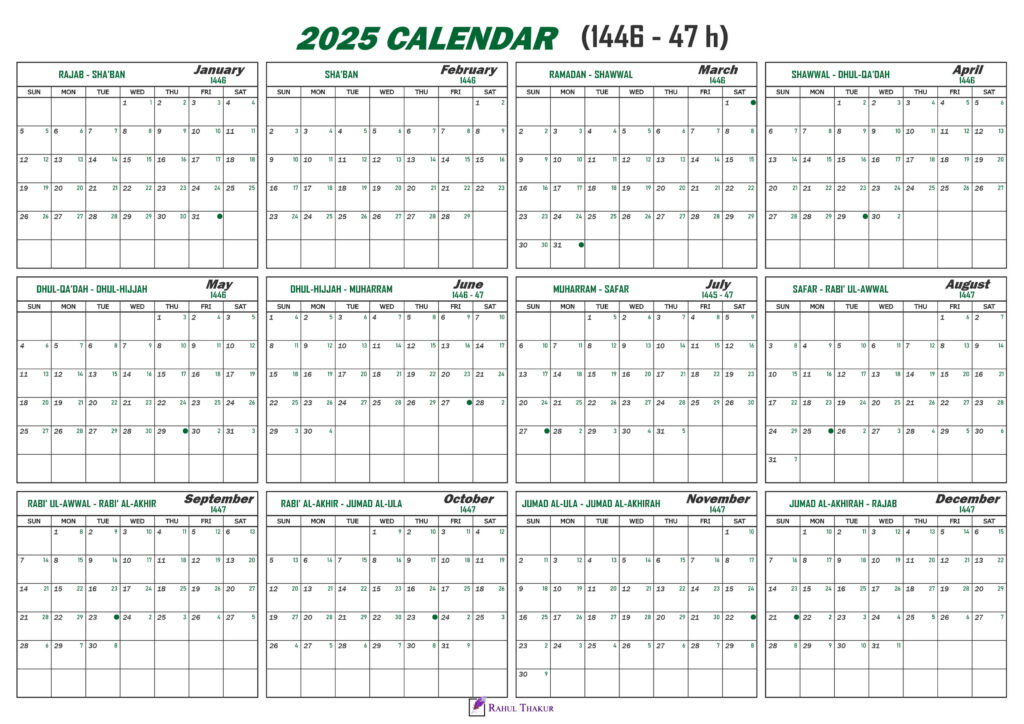
The Hijri calendar, also known as the Islamic calendar, is based on lunar observations and is used by millions of Muslims worldwide to keep track of critical religious dates and events. The Islamic calendar is composed of twelve months, each with either 29 or 30 days. In this way, it is around 11 days shorter than the Gregorian calendar commonly used in the Western world.
The Islamic year begins with Muharram and commemorates the Hijra. Hijra is the Prophet Muhammad’s migration from Mecca to Medina in 622 CE. This significant event is considered the starting point for the Islamic calendar and serves as a reminder of the importance of family, community, and faith.
In Islamic culture, the Hijri calendar determines the timing of religious observances. These observances are as Ramadan, the month of fasting, and Eid al-Fitr, the celebration marking the end of Ramadan. Overall, the Hijri calendar is a vital component of Islamic culture. The Islamic Calendar 2025 with Hijri Dates will be widely utilized by Muslims worldwide to commemorate and celebrate their religious events and traditions.
Key dates in 2025 for lunar events such as Ramadan, Eid al-Fitr, and Hajj
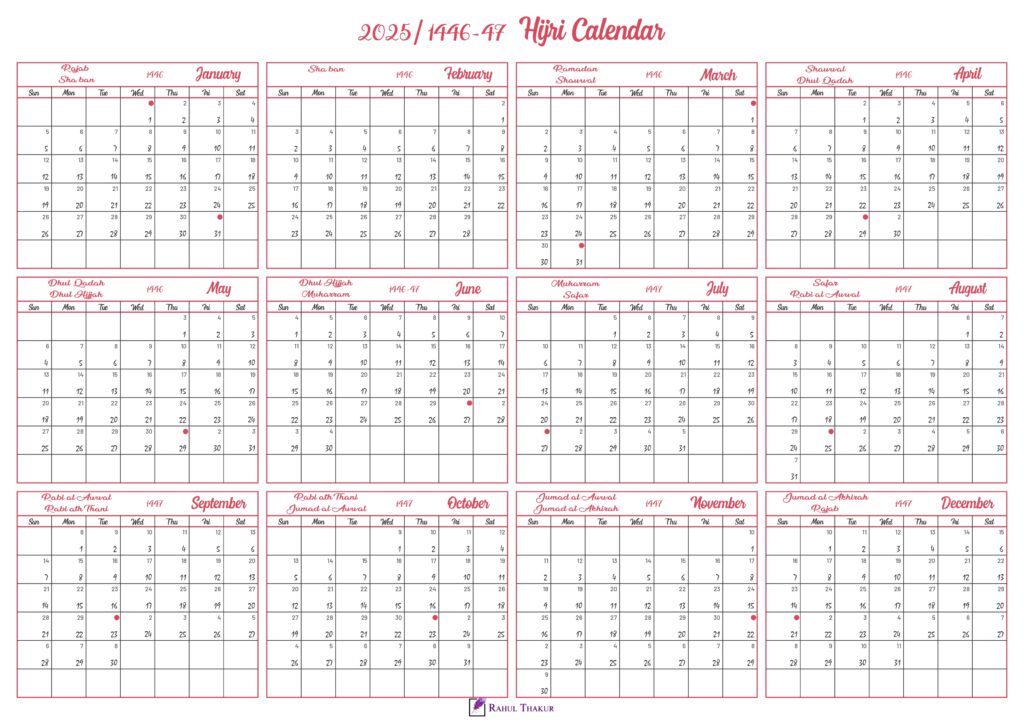
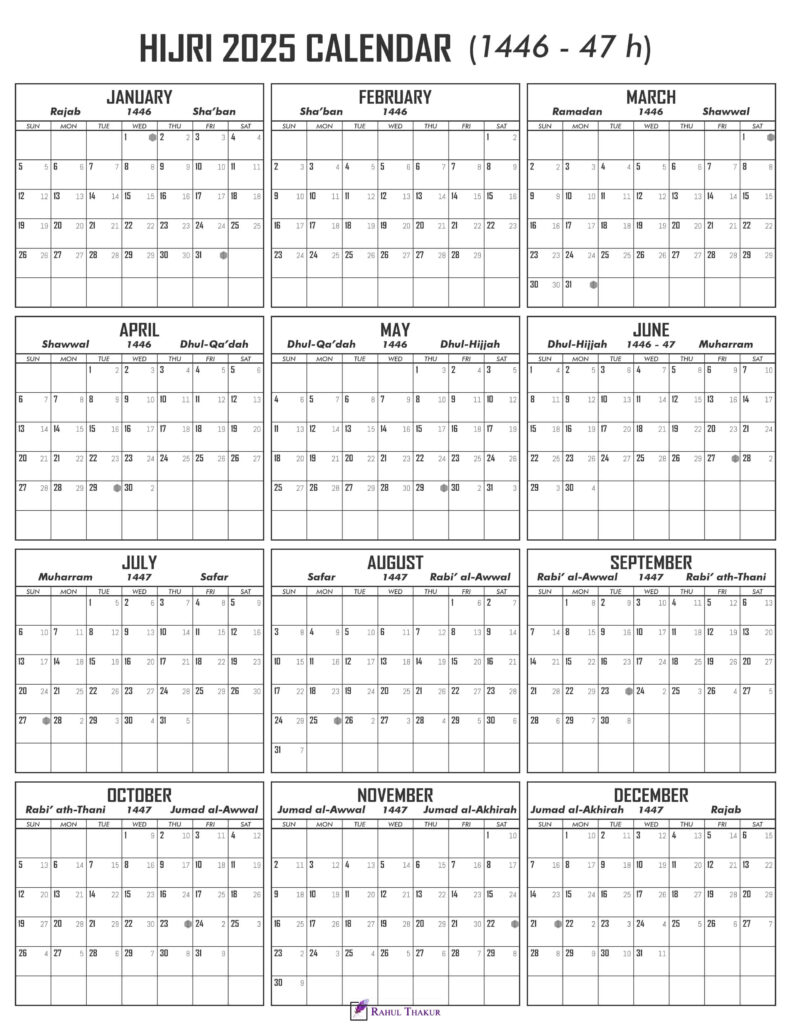
The Islamic calendar for 2025 (Hijri 1446-47) is shown in the table below:
| Islamic Month | Starting Date | Ending Date |
| Rajab | January 1, 2025 | January 30, 2025 |
| Sha’ban | January 31, 2025 | February 28, 2025 |
| Ramadan | March 1, 2025 | March 30, 2025 |
| Shawwal | March 31, 2025 | April 28, 2025 |
| Dhul-Qa’dah | April 29, 2025 | May 28, 2025 |
| Dhul-Hijjah | May 29, 2025 | June 27, 2025 |
| Muharram | June 28, 2025 | July 26, 2025 |
| Safar | July 27, 2025 | August 24, 2025 |
| Rabi’ al-Awwal | August 25, 2025 | September 22, 2025 |
| Rabi’ al-Thani | September 23, 2025 | October 22, 2025 |
| Jumad al-Awwal | October 23, 2025 | November 21, 2025 |
| Jumad ath-Thani | November 22, 2025 | December 20, 2025 |
| Rajab | December 21, 2025 | January 18, 2026 |
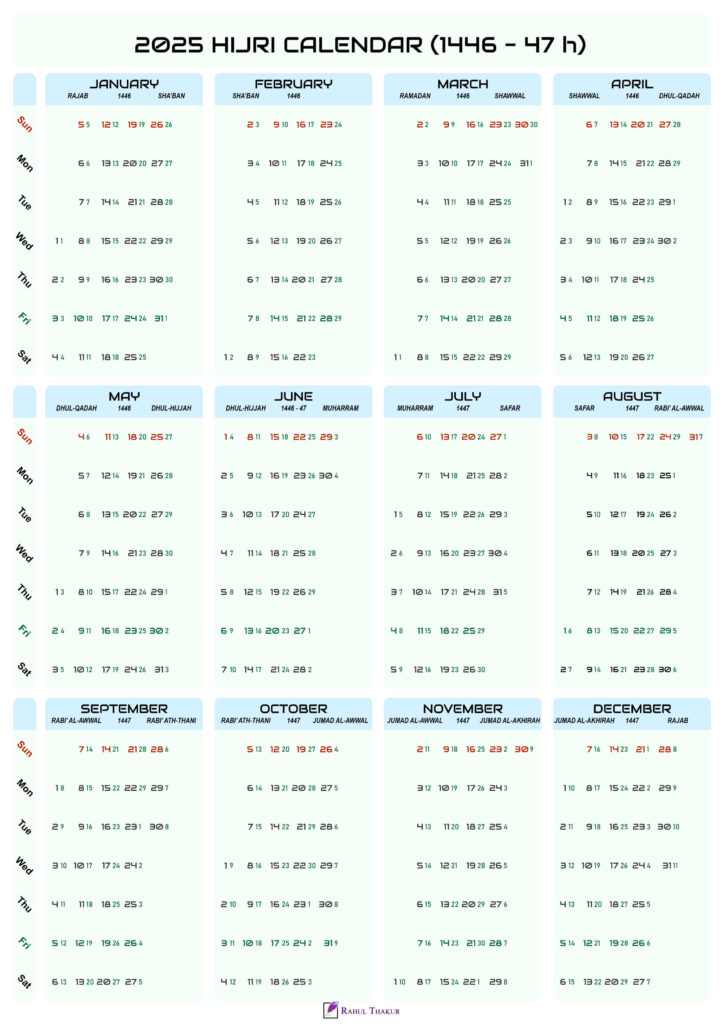
As seen from the table above, Ramadan will begin on March 1st and conclude on march 30th, 2025. Eid al-Fitr, the celebration marking the end of Ramadan, will fall on March 31st, 2025. The Hajj pilgrimage is an integral part of the Islamic religion and falls annually in Dhul Hijjah, usually between the 9th to 13th days of the month. In 2025, the Hajj will occur between June 6th and 10th.
We hope this overview of the 2025 Islamic Calendar (Hijri 1446-47) has helped answer all your questions regarding religious events throughout the year.
Exploring cultural customs associated with Islamic Calendar months
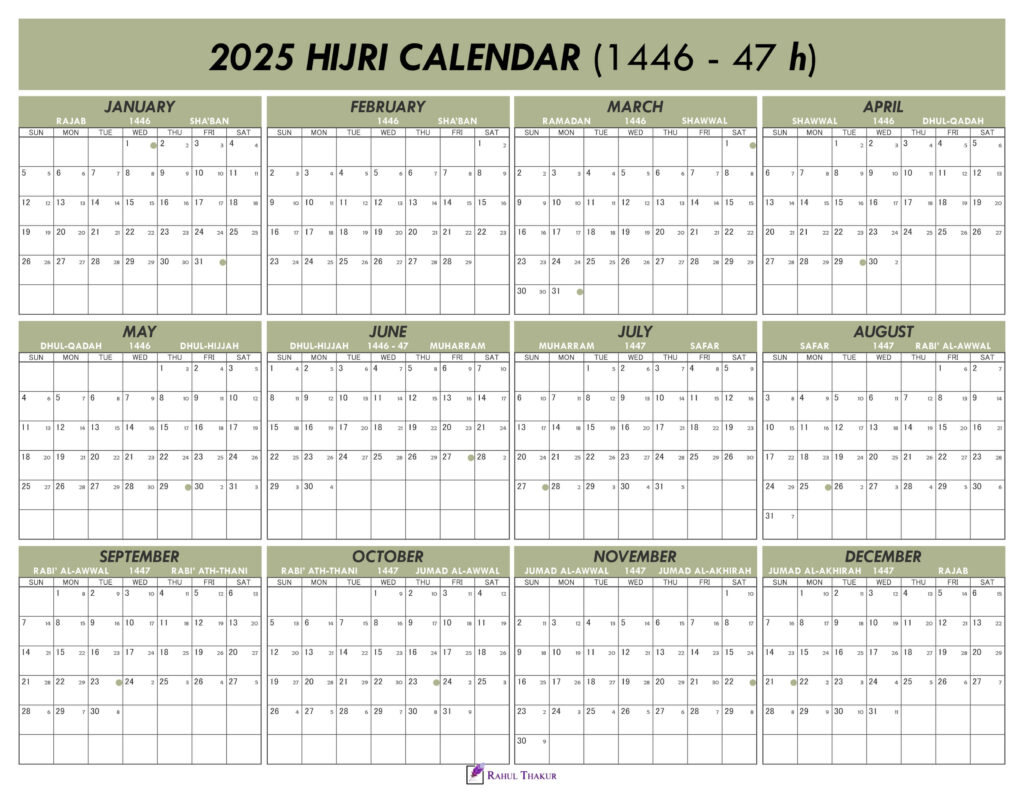
Each month of the Islamic calendar has its cultural traditions and practices related to it.
During Muharram, Muslims commemorate the martyrdom of Imam Hussain ibn Ali, a grandson of Prophet Muhammad, by engaging in mourning ceremonies throughout the first ten days.
In Safar, Muslims fast to commemorate Prophet Muhammad’s journey from Mecca to Medina during the Hijra.
The third month of the Islamic calendar, Rabi ul-Awwal, is significant as it marks the birth of the Prophet Muhammad. During this time, many Muslims celebrate Milad-un-Nabi or Mawlid by organizing gatherings and sharing food with their communities.
The month of Rabi al-Akhir marks the death of Prophet Muhammad and is essential for Muslims to reflect on his teachings.
Jumad al-Awwal is the fifth month in the Hijri calendar. During this time, Muslims commemorate important events, such as the victory of Muslims in the Battle of Tabuk.
In Jumad al-Akhirah, Muslims fast and engage in charitable activities to gain closeness to God. During this month, many important Islamic events took place, including the death of Hazrat Fatima and some Islamic battles.
In Rajab, some people fasting on the 27th night of this month as an act of worship.
In Sha’ban, Muslims prepare for the upcoming month of Ramadan by seeking forgiveness from God and performing different acts of worship.
Ramadan is a holy month in which all Muslims fast throughout the day and break their fasts together with family at night. It is also a month filled with prayer, reflection, charity, and gathering with friends and family to celebrate the joyous occasion.
During Shawwal, Muslims partake in the Eid-ul Fitr celebration to mark the end of Ramadan. It is a joyous occasion that involves gathering with family, friends, and neighbors for feasts and exchanging gifts.
Dhul Qadah marks the beginning of the Hajj pilgrimage for those who can perform it.
Dhul Hijjah is the month they depart for the pilgrimage, and during this time, Muslims are encouraged to give generously in charity and recite supplications.
Discussions on how the Islamic Calendar impacts daily life
The Hijri calendar has a significant impact on Muslim communities around the world. From spiritual observances such as Ramadan to critical social gatherings like Milad-un-Nabi, the Islamic calendar helps Muslims to stay connected and celebrate their faith. Additionally, the Hijri calendar allows people to reflect on their spiritual identity and how they can use religion to influence their lives and those around them positively.
The Hijri Calendar also serves as a reminder of the importance of family and community in Islam. Muslims can strengthen their bonds with family, friends, and society by participating in religious gatherings and celebrating important events together.
Overall, the Islamic calendar provides an essential guide for practicing Muslims throughout the year. From Ramadan to Hajj, 2025 Hijri Calendar Template will help to remind you of critical spiritual principles. It will also encourage to stay connected with your faith daily.
The Printable Islamic Calendar 2025 (Hijri 1446-47) provides an essential guide to help Muslims observe their religious events and customs and connect with family and community meaningfully. It is an integral part of Islam that helps to bring people together and foster stronger connections throughout the year.
Tips on making the most of festivals and other events throughout the year
There are many ways to make the most of Islamic festivals and events throughout the year. Here are a few tips for making the most of these essential religious occasions:
1. Celebrate with friends and family: Gather with your loved ones to celebrate important Islamic festivals by hosting dinners, organizing activities, or spending time together.
2. Adopt meaningful customs: There are a variety of Islamic traditions that someone can adopt throughout the year—from fasting during Ramadan to giving charity in Dhul Hijjah.
3. Reflect on the teachings of Prophet Muhammad: Reflect on the instructions and guidance provided by Prophet Muhammad. Especially during essential months such as Rabi al-Awwal, which marks his birth.
4. Pray diligently: Make the most of festivals and other events by praying more frequently. It is a great way to increase your spiritual connection with Allah and gain blessings.
5. Share meals with others: Spend time sharing meals with those who are less fortunate or hosting potlucks for friends and family. It is a great way to strengthen bonds and create meaningful connections throughout the year.
By following these tips, you can make the most of each Islamic festival and event throughout the year – from Ramadan to Hajj. So, deepen your spiritual connection with Allah.
We hope this overview of the 2025 Hijri Calendar has helped us understand the significance of the Islamic calendar and how it impacts daily life. For more information on upcoming Islamic events, please refer to our online resources or contact your local mosque for assistance.
Thank you for learning about the Islamic calendar – we wish you a blessed Ramadan and Eid-ul Fitr!
